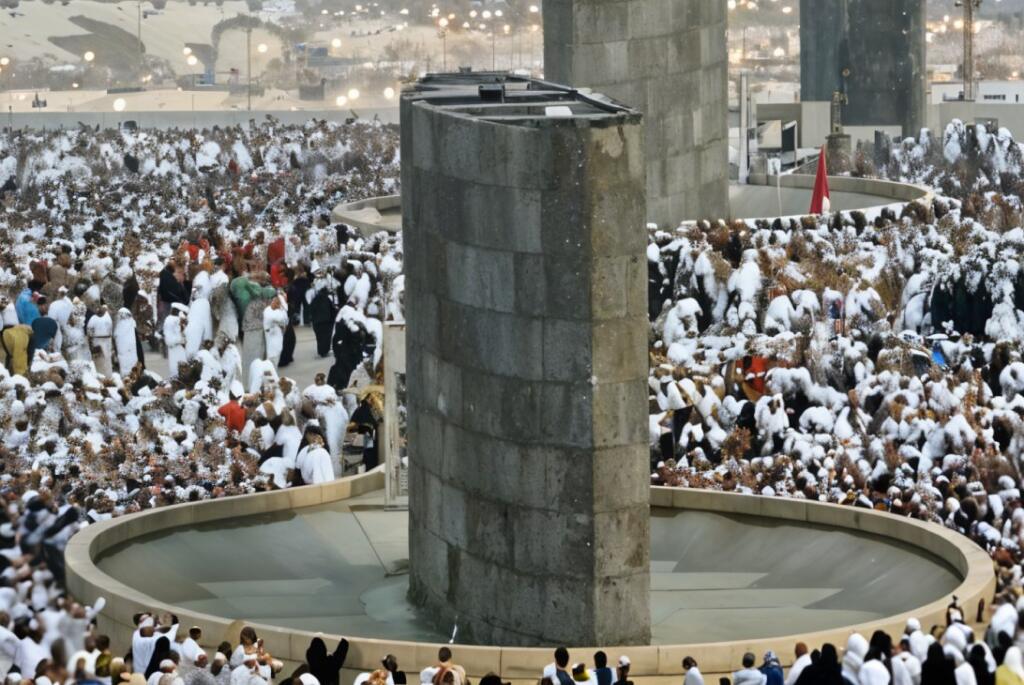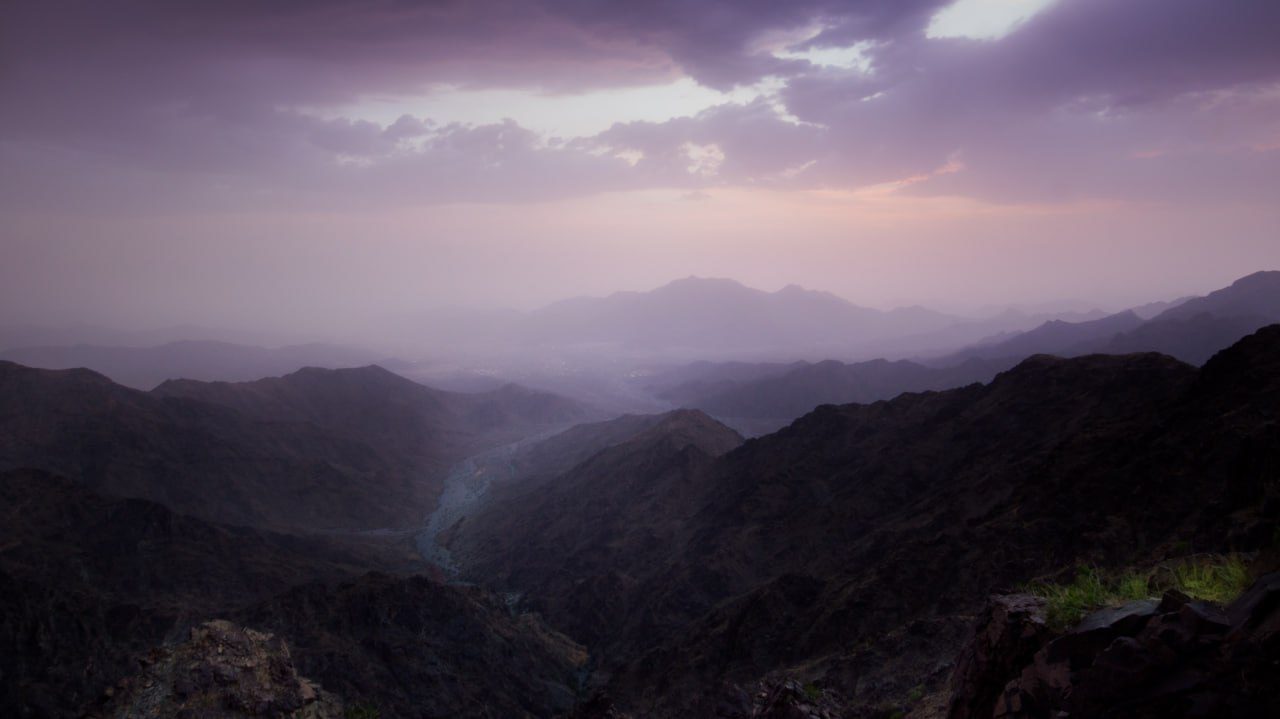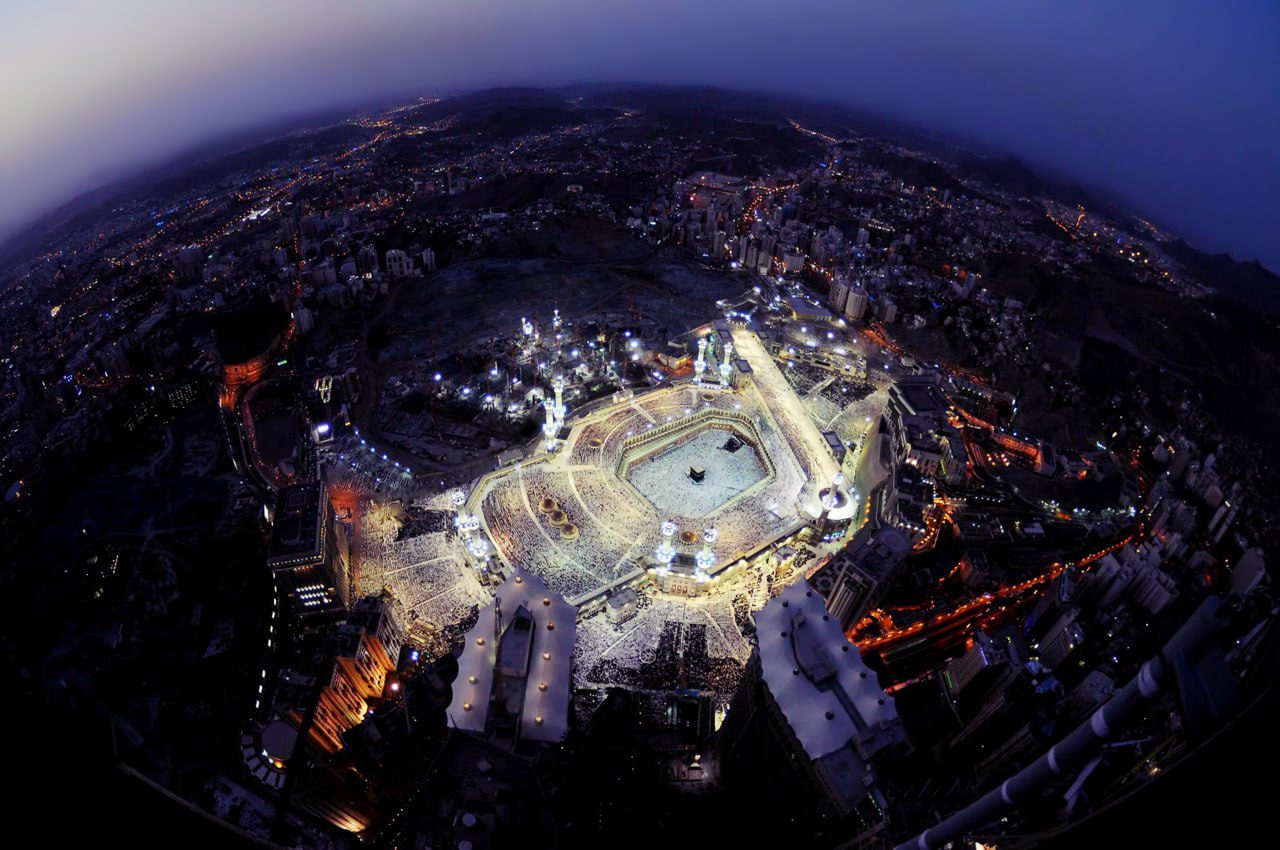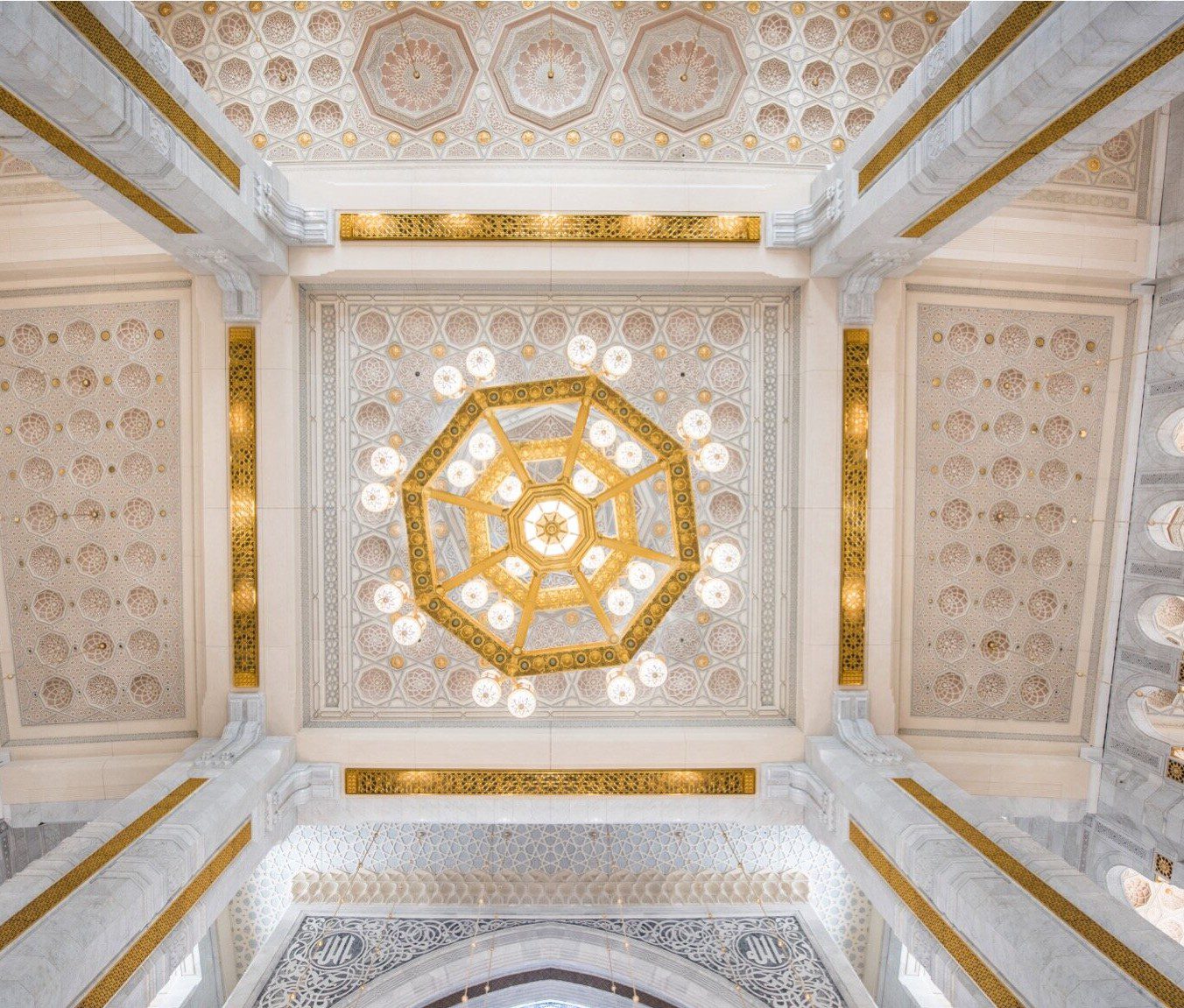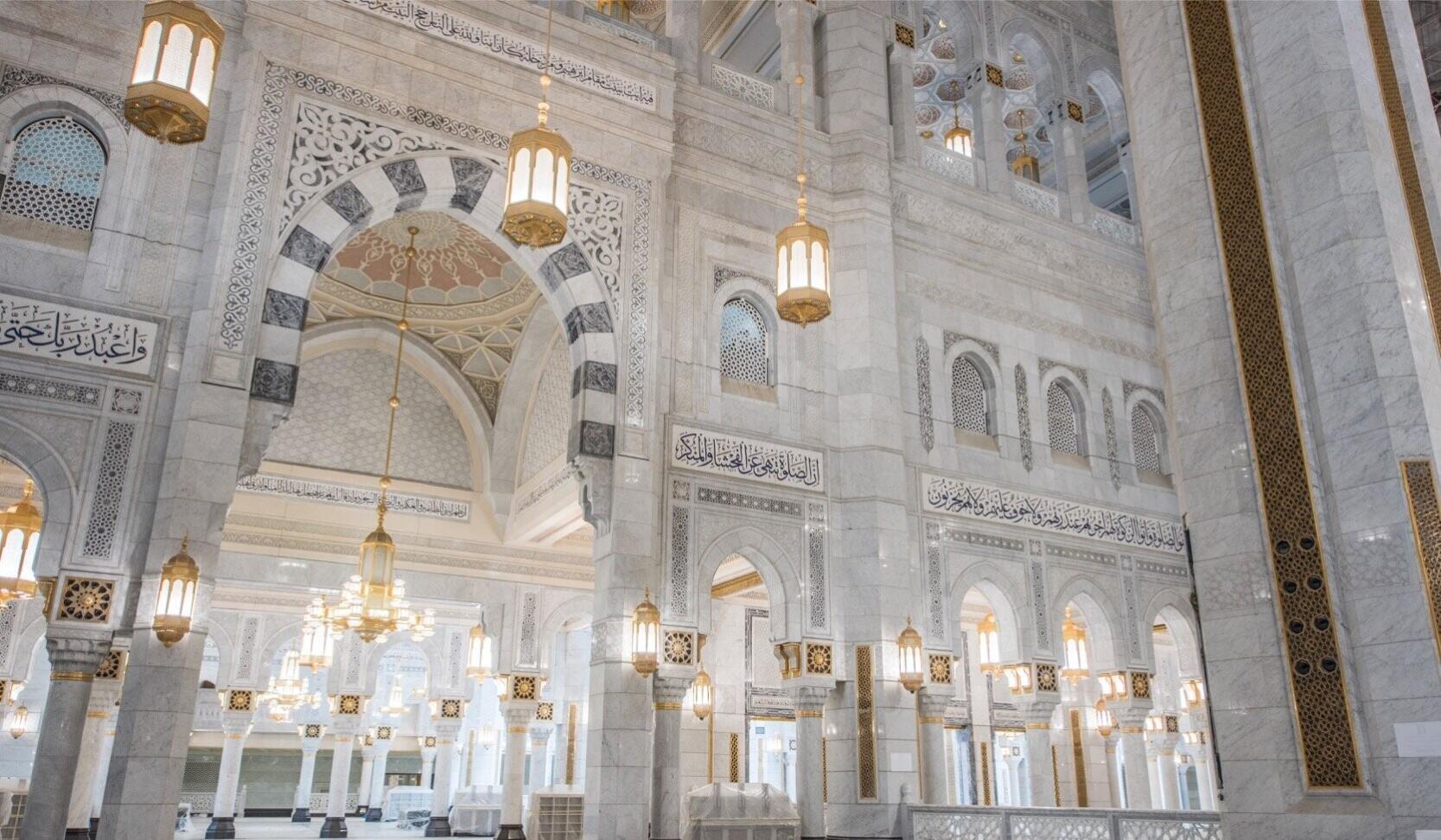Sacrificing an Animal
The Prophet ﷺ sacrificed 63 camels with his own hands (equating the years of his life). He told ʿAlī (raḍiy Allāhu ʿanhu) to sacrifice the rest and cook a portion for them to eat. He also told the Companions (radiy Allāhu ʿanhum), “Whoever wishes to take a portion may do so.”
The Prophet ﷺ said, “There is nothing more beloved to Allah that a slave can do on the day of Naḥr than spill blood (i.e. qurbānī). On the Day of Judgement, it will be brought forth with its horns, hair, and hooves. Indeed, the blood will be accepted by Allah even before it spills on the ground, therefore whole-heartedly delight in (performing the sacrifice)” (Tirmidhī).
The Secrets of the Sacrifice
The sacrifice commemorates the īmān and submission of Ibrāhīm (ʿalayhis-salām) . Ibrāhīm (ʿalayhis-salām) was commanded to sacrifice his son: a son who was born after many years of childlessness; a source of solace after being forced to leave his homeland; and a model child who was the coolness of his eyes. He was not asked to send his beloved son to war, rather he himself was asked to sacrifice him with his own hands. The purpose of this test was not to sacrifice his child, but to remove the love of anyone other than Allah from his heart.
The following are some secrets of sacrificing an animal:
1. Keep Allah at the centre of your heart. Ibrāhīm (ʿalayhis-salām) taught us how to fully slaughter our nafs and submit to Allah with unwavering sincerity. In an era where it has become fashionable to question everything and only follow what aligns with our (deficient) intellect, we should look to Ibrāhīm (ʿalayhis-salām) who didn’t ask: ‘Why?’ Instead, he submitted and fully obeyed Allah and for that, he was rewarded handsomely. If you want to be the khalīl (best friend) of Allah then nothing should hold a greater place in your heart than Allah.
What Allah wants from you is your heart; a heart which fully submits to Him, which melts out of His love, crumbles from His fear, and gives preference to Him over everything and everyone else.
Reflect: What is competing in your heart with Allah? Do you love Him more than anything else in the world? You can assess this by reflecting on what or whom you give preference to over the command of Allah.
Act: Allah (subḥānahū wa ta‘ālā) does not ask you to put a knife to our children’s necks, but He asks you to sacrifice other things, be it time, money, your desires or even societal pressure to conform. Write down one thing that you will give up today for Allah’s sake.
2. Remember that the intended outcome is taqwā. The ultimate aim of sacrifice is not the shedding of blood or the offering of meat. It is the cultivation of taqwā: “Never does their meat or their blood reach Allah, but what does reach Him is your taqwā (piety)…” (22:37).
Reflect: Take a moment out during the Day of Naḥr and reflect on the lesson of sacrifice. Think about your life: what inclinations do you have that are not in line with what Allah wants, be they ideological, physical or emotional?
3. Share your wealth with the poor. Allah ﷻ says, “We have made camels part of the symbols of Allah for you. There is much good in them for you, so invoke Allah’s name over them as they are lined up for sacrifice. Then when they have fallen down dead, eat from it, and feed those who do not ask, as well as those who do…” (22:36). A portion of the slaughtered animal should go to the poor: this is their right and is a form of purification of your soul.
The wisdom in a portion of the animal going to the poor is that you will choose the best animal for yourself and so the poor also receive from the best.
Reflect: When you give to those in need, do you give from what you love? Or do you give what’s left over or no longer of use to you? Allah ﷻ says, “You shall never attain righteousness unless you donate some of what you love. Whatever you spend, Allah is fully aware of it” (3:92).
Act: Write down a material item you love the most. When you go home, donate it to the most needy. This will help you achieve true righteousness.
4. Remember, glorify and declare the Oneness of Allah. Allah ordained sacrifice so that you remember Him, glorify Him and proclaim His Oneness through your actions, by sacrificing for Him Alone. Allah ﷻ says, “For every ummah (religious community), We prescribed the act of sacrifice, so that they may invoke the name of Allah over the livestock He provided for them: So, your God is One God, so submit to Him Alone…” (22:34). Dhikr is the hallmark of the qurbānī and these blessed days.
5. Thank Allah. Thank Him for guiding you to Islam and for giving you the ability to remember Him and to perform the rites of sacrifice: “…He has subjugated the [animals] to you in this way so that you may glorify Allah for having guided you…” (22:37).
The sacrifice is a reminder that Allah has given you this great gift of being able to rear, slaughter and consume delicious meat. Although an alien concept to us because of our excessive consumption of meat, for many around the world, this is the only time in the year when they can consume a liberal amount of meat.
“I used to forbid you to store the meat of the sacrificed animals for more than three days so that there would be enough for everyone. But now Allah, the Mighty and Sublime, has bestowed plenty Upon us, so eat, give in charity and store. Indeed, these days are the days of eating, drinking and remembering Allah” – Prophet Muhammad ﷺ (Nasā’ī).
Shaving the Head
ثُمَّ لْيَقْضُوْا تَفَثَهُمْ وَلْيُوْفُوْا نُذُوْرَهُمْ وَلْيَطَّوَّفُوْا بِالْبَيْتِ الْعَتِيْقِ
Then, they must remove their dirt, fulfill their vows, and make ṭawāf of the Ancient House (22:29).
After finishing his sacrifice, Maʿmar b. ʿAbdillāh came to the Prophet ﷺ to shave his head. The Prophet ﷺ joked with him saying, “Maʿmar, Allah’s Messenger lets you have his head when your blade is in your hand”. Maʿmar replied saying, “This is a favour Allah has bestowed upon me,” to which the Prophet ﷺ replied, “Then I will sit still for you.”
The Companions surrounding the Prophet ﷺ were eager to not allow a single hair to fall to the ground and instead collected it. Upon shaving the left part of his head, the Prophet ﷺ called upon Abū Ṭalḥah (raḍiy Allāhu ʿanhu) and gave him all the hair from his left side. The Prophet ﷺ then prayed for the men who who shaved their heads three times, saying: “Allah, bestow your mercy on those who shaved, and prayed once for those men who trimmed their hair” (Bukhārī).
Reflect: Abū Ṭalḥah, his wife Umm Sulaym and his step-son, Anas (raḍiy Allāhu ʿanhu) served and welcomed the Prophet ﷺ in Madinah. The Prophet ﷺ chose this day to repay the favour, and honour Abū Ṭalḥah, and in what a blessed way! Allāhu Akbar!
Act: You are going for ḥajj so don’t prevent yourself from the maximum reward and shave your head instead of simply trimming it (for men only). There is a much greater reward in shaving and you have the honour of the Prophet ﷺ praying for you three times!
He ﷺ then put on his normal clothes and ʿĀ’ishah (raḍiy Allāhu ʿanhā) applied musk on him with her own hands.
The Secrets of Shaving the Head
- Visualise your sins falling away. For every hair that gets shaved, you gain a reward and a sin gets wiped away (Bazzār).
- Remove your ego. Shaving your hair is the final act of shedding pride from your heart. You are removing the last trace of ego before standing in humility at the House of Allah.
- Get ready for a new you. Shaving your hair signifies a new birth, a new beginning and a new you: “Whoever performs ḥajj for the sake of Allah and refrains from intimate relations and sins will return as free of sin as the day his mother gave birth to him” (Bukhārī).
Reflect: You have had your sins forgiven, you have slaughtered your nafs and you have removed any trace of arrogance. You have gone through the process of transformation, both spiritually and physically. Now, you are ready to go to Allah’s House.
Tawaf al-Ifadah
This is it. The whole journey was meant to build you up to come to the House of Allah: the ultimate destination.
Refer to the ṭawāf article. Along with the secrets mentioned there, internalise these additional secrets during your ṭawāf al-ifāḍah (otherwise known as ṭawāf al-ziyārah):
- Go to Allah with a heart overflowing with love. ‘Ifāḍah’ comes from the word ‘fayḍān’ which means flood or burst. When you go to His House, you are bursting with emotions, feelings and desires to be close to Allah.
- Liberate your heart. الْبَيْتِ الْعَتِيقِ mentioned in the verse above (22:29) has three meanings:
- Ancient.
- Free from the sovereignty and ownership of anyone.
- Honoured and revered.
When doing ṭawāf of ‘al-Bayt al-ʿAtīq’, you are hoping that Allah will liberate your heart from all of its desires and its enslavement to Shayṭān. And now, your heart is liberated, free to worship Allah.
The ultimate freedom is the freedom of the heart. When the heart is free from all of the shackles of the dunyā, it tastes a comfort and joy that cannot be matched by anything.
Reflect: Does your heart feel free? If not, what is holding it back? A truly free heart is one that seeks only to please Allah; not to chase its own desires or the approval of others.
After ṭawāf, the Prophet ﷺ prayed two rakʿahs (refer to tawaf article for detail).
The Prophet ﷺ then went to the Zamzam well and saw people from the family of ʿAbdul Muṭṭalib working there, pulling out the water. He also commended them saying “Carry on with this good work”. He drank the water and said: “Had it not been for fear that you may be overwhelmed, I would have worked with you” i.e. He was fearful people may treat it as a sunnah and thus most would want to do it causing congestion.
Act: Be in the service of people. Be giving and forgiving, not demanding and expecting.
Tip: When packing for ḥajj, pack lightly, but take one nice outfit to wear after coming out of iḥrām, just before going to the house of Allah for ṭawāf al-ifāḍah. You will want to look nice and present yourself in the best way.
Saʿy
The Companions (radiy Allāhu ʿanhum) who performed tamattuʿ then did saʿy. Refer to the saʿy article.
The Additional Secrets of the Day of Nahr
- Reflect on the kindness of Allah. The Day of Naḥr highlights the mercy of Allah. Allah gave His servants flexibility in performing the rites of ḥajj e.g. choosing between shaving or trimming the hair.
- Reflect on the mercy and compassion displayed by the Prophet ﷺ on the Day of al-Naḥr:
- One man asked the Prophet ﷺ: “I shaved my head before stoning.” The Prophet ﷺ told him: “Do the stoning now, there is no harm.” Others asked: “I performed ṭawāf before stoning.” He ﷺ replied once again, “There is no harm.”
- Even when it came to shaving or trimming the hair, the Prophet ﷺ made duʿā’ for mercy for those who trimmed. He did not limit it only to those who shave, although he did pray for those who shaved three times over.
Tip: Don’t sweat the small stuff or lose your hair over the minute details of ḥajj. Stay focused on the bigger picture. The actions of ḥajj are surrounded by mercy: if a duty can’t be fulfilled due to a valid reason or has been unintentionally missed out, there’s no sin, just compensation in most cases. Don’t panic if you make a mistake or are unsure about something. Consult a scholar who will be able to guide you.
Reflect: Imagine, the Prophet ﷻ accomplished all of this: stoning the Jamarah, giving a speech, answering questions, assigning camping places, slaughtering 63 animals with his own hands, shaving his head, changing his clothes, going to Makkah, doing ṭawāf, blessing people and then going back to Minā, all in the space of half a day. Allah blessed him and his time immensely, and he was thus able to deliver the enormous message in 23 years of his blessed life too. Ṣall Allāhu ʿalayhi wa sallam.


